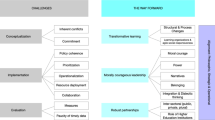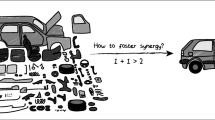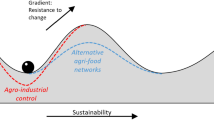Abstract
Social movements are using education to generate critical consciousness regarding the social and environmental unsustainability of the current food system, and advocate for agroecological production. In this article, we explore results from a cross-case analysis of six social movements that are using education as a strategy to advance food sovereignty. We conducted participatory research with diverse rural and urban social movements in the United States, Brazil, Cuba, Bolivia, and Mexico, which are each educating for food sovereignty. We synthesize insights from critical food systems education and the political ecology of education in analyzing these cases. We compare the thematic similarities and difference between these movements’ education initiatives in terms of their emergence, initial goals, expansion and institutionalization, relationship to the state, theoretical inspirations, pedagogical approach, educational topics, approach to student research, and outcomes. Among these thematic areas, we find that student-centered research on competing forms of production is an integral way to advance critical consciousness about the food system and the political potential of agroecological alternatives. However, what counts, as success in these programs, is highly case-dependent. For engaged scholars committed to advancing education for food sovereignty, it is essential to reflect upon the lessons learned and challenges faced by these movements.
Similar content being viewed by others
Notes
A review of the Journal of Peasant studies—one of the central journals in agrarian studies—shows only several articles that focus on the connections between food sovereignty and education, and these few have just been published in the last 2 years (Meek 2015a; Tarlau 2015a). Considering other fields, it is clear that the linkages between agroecology and education have received extensive attention, but not in the context of food sovereignty (Lieblein et al. 2007; Francis et al. 2013; Hilimire et al. 2014).
These Cuban pro-peasant programs include: distribution of land, crop insurance, the National Programs for Urban Agriculture and Suburban, for Production of Biological Inputs, for Animal Traction, for Production of Organic Matter, the Forum Movement on Science and Technology, the Growing Popular Rice Program, the Participatory Plant Breeding Program, programs to acquire farm animals, to achieve decentralized self-sufficiency in dairy products, to redesign curricula, to produce special programs on TV and radio and newspaper coverage (Machín Sosa et al. 2013).
Even before the PT took power, in 2001, the federal government passed national guidelines for Educação do Campo. This was due to a coalition of agrarian social movements and the rural union movement, who put pressure on the federal government to embrace these policies.
Others teachers are from private schools recognized by the SEP, and a few teach at autonomous schools.
Abbreviations
- ANAP:
-
National Association of Small Farmers (Cuba)
- CaC:
-
Campesino a Campesino (Cuba)
- CPATI:
-
Colonia Pirai Agroecological Technical Institute (Bolivia)
- EBUFFS:
-
East Bay Urban Farmer Field School (USA)
- FW:
-
Food Warriors (USA)
- LabVida:
-
Laboratorios para la Vida (Mexico)
- MACaC:
-
Farmer-to-Farmer Agroecology Movement (Cuba)
- MST:
-
Landless Workers Movement (Brazil)
References
Apple, M.W. 2006. Educating the “right” way: Markets, standards, god, and inequality. New York: Routledge.
Barbosa, L.P. 2015. Educación, resistencia y movimientos sociales: La práxis educativo-política de los Sin Tierra y de los Zapatistas. Mexico City: LIBRUNAM.
Barbosa, L.P. 2016. Educação do campo [Education for and by the countryside] as a political project in the context of the struggle for land in Brazil. The Journal of Peasant Studies. https://doi.org/10.1080/03066150.2015.1119120.
Baronnet, B. 2008. Rebel youth and Zapatista autonomous education. Latin American Perspectives 35 (4): 112–124.
Bradley, K., and H. Herrera. 2016. Decolonizing food justice: Naming, resisting, and researching colonizing forces in the movement. Antipode 48(1): 97-114.
Branford, S., and J. Rocha. 2002. Cutting the wire: The story of the Landless Movement in Brazil. London: Latin America Bureau.
Cadji, J., and A. Alkon. 2014. One day, the white people are going to want these houses again. In Incomplete streets: Processes, practices and possibilities, eds. S. Zavestoski, and J. Agyeman, 154–175. London: Routledge.
Caldart, R.S. 2004. Pedagogia do Movimento Sem Terra. Sao Paulo: Expresso Popular.
Carnoy, M. 1985. The political economy of education. International Social Science Journal 37 (2): 157–173.
Carolan, M.S. 2006. Social change and the adoption and adaptation of knowledge claims: Whose truth do you trust in regard to sustainable agriculture? Agriculture and Human Values 23 (3): 325–339.
Caron, P., et al. 2014. Making transition towards ecological intensification of agriculture a reality: The gaps in and the role of scientific knowledge. Current Opinion in Environmental Sustainability 8: 44–52.
Carter, M., ed. 2015. Challenging social inequality: The Landless Rural Worker’s Movement and agrarian reform in Brazil. Chapel Hill: Duke University Press.
Carter, M., and H.M. Carvalho. 2015. The struggle on the land: Source of growth, innovation, and constant challenge for the MST. In Challenging social inequality: The Landless Rural Worker’s Movement and agrarian reform in Brazil, ed. M. S. Carter, Chapel Hill: Duke University Press.
Cleaver, H.M.J. 1972. The contradictions of the Green Revolution. The American Economic Review 62 (1/2): 177–186.
CPATI (Colonia Pirai Agroecological Technical Institute). 2015. Cuarenta Años de la Fundacion Colonia Pirai: Memoria Historica. Santa Cruz: CPATI (Colonia Pirai Agroecological Technical Institute.
Daniel, P. 2013. Dispossession: Discrimination against African American farmers in the age of civil rights. Chapel Hill: University of North Carolina Press.
Diniz-Pereira, J.E. 2005. Teacher education for social transformation and its links to progressive social movement: The case of the landless workers movement in Brazil. Journal for Critical Education Policy studies 3 (2): 92–123.
Dissanayake, W. 1992. Knowledge, culture, and power: Some theoretical issues related to the agricultural knowledge and information system framework. Knowledge, Technology & Policy 5 (1): 65–76.
Eshuis, J., and M. Stuiver. 2005. Learning in context through conflict and alignment: Farmers and scientists in search of sustainable agriculture. Agriculture and Human Values 22 (2): 137–148.
Fernandes, B.M. 2009. Sobre a tipologia de territórios. In Territórios e territorialidades: Teoria, processos e conflitos, eds. M. A. Saquet, and E. S. Sposito, 197–215. Sao Paulo: Expressão Popular.
Francis, C., T.A. Breland, E. Ostergaard, G. Lieblein, and S. Morse. 2013. Phenomenon-based learning in agroecology: A prerequisite for transdisciplinarity and responsible action. Agroecology and Sustainable Food Systems 37: 60–75.
Freire, P. 1973a. Pedagogy of the oppressed. New York: Continuum.
Freire, P. 1973b. Education for critical consciousness. New York: Seabury Press.
Freire, P., et al. 1986. Pedagogia: Diálogo e conflito. Sao Paulo: Cortez.
Godek, W. 2015. Challenges for food sovereignty policy making: The case of Nicaragua’s Law 693. Third World Quarterly 36 (3): 526–543.
Gray, I., et al. 1997. Power, interests and the extension of sustainable agriculture. Sociologia ruralis 37 (1): 97–113.
Gruenewald, D.A. 2003. The best of both worlds: A critical pedagogy of place. Educational Researcher 32 (4): 3–12.
Guthman, J. 2008. Neoliberalism and the making of food politics in California. Geoforum 39: 1171–1183.
Henke, C.R. 2008. Cultivating science, harvesting power: Science and industrial agriculture in California. Cambridge: The MIT Press.
Heyneman, S.P. 2005. The history and problems in the making of education policy at the World Bank. In Global trends in educational policy, vol. 6, eds. A.W. Wiseman, and D.P. Baker. San Diego: Elsevier.
Hilimire, K., S. Gillon, B.C. McLaughlin, B.M. Dowd, and K. Monsen. 2014. Food for thought: Developing curricula for sustainable food systems education programs. Agroecology and Sustainable Food Systems 38: 722–743.
Holt-Gimenez, E. 2006. Campesino a Campesino: Voices from Latin America’s farmer-to-farmer movement for sustainable agriculture. Oakland, CA: Food First Books.
Ingram, J. 2008. Agronomist–farmer knowledge encounters: An analysis of knowledge exchange in the context of best management practices in England. Agriculture and Human Values 25 (3): 405–418.
IPEA. 2015. Relatório da II Pesquisa Nacional sobre a Educação na Reforma Agrária. Brasilia: Instituto de Pesquisa Aplicada.
Klein, M. G., J.A. Girón, B. Hernández Zavaleta, M. López López, S.I. Navarro Martínez, B.C. Salazar Narvaéz, A. Saldívar Moreno, N.E. Santos Baca. 2014. Desde Chiapas: Criterios básicos para la exigencia de pertinencia cultural y lingüística en la educación, In Desenmascarar la discriminación: La violencia del sistema educativo mexicano hacia los pueblos originarios y las personas con discapacidad. eds. P.T. Baltazar, 69–94. San Cristóbal de Las Casas, Mexico: Incidencia Civil en la Educación.
Kloppenburg, J.R. 1988. First the seed: The political economy of plant biotechnology, 1492–2000. Cambridge: Cambridge University Press.
Leff, E. 2004. Racionalidad ambiental y diálogo de saberes. Significancia y sentido en la construcción de un futuro sustentable. Polis. Revista Latinoamericana 7: 1–29.
Lerner, A.M., and H. Eakin. 2011. An obsolete dichotomy? Rethinking the rural-urban interface in terms of food security and production in the global south. Geographical Journal 177: 311–320.
Lewontin, R., and R. Levins. 2007. Biology Under the Influence: Dialectical Essays on Ecology, Agriculture, and Health. New York: Monthly Review Press.
Lieblein, G., T.A. Breland, E. Ostergard, L. Salomonsson, C. Francis. 2007. Educational perspectives in agroecology: Steps on a dual learning ladder toward responsible action. NACTA Journal 51: 37–44.
Lomawaima, K.T., and T.L. McCarty. 2002. When tribal sovereignty challenges democracy: American Indian education and the democratic ideal. American Educational Research Journal 39 (2): 279–305.
Machín Sosa, B., A.M. Roque Jaime, D.R. Ávila Lozano, and P.M. Rosset. 2010. Revolución agroecológica: el movimiento de campesino a campesino de la ANAP en Cuba. Cuando el campesino ve, hace fe. La Habana: ANAP y La Vía Campesina. http://www.viacampesina.org/downloads/pdf/sp/2010-04-14-rev-agro.pdf
Machín Sosa, B., et al. 2013. Agroecological revolution: The farmer-to-farmer movement of the ANAP in Cuba [online]. Havana and Jakarta: ANAP and La Vía Campesina. http://viacampesina.org/downloads/pdf/en/Agroecological-revolution-ENGLISH.pdf. Accessed 21 May 2016.
McAdam, D., and D.A. Snow. 1997. Social movements: Readings on their emergence, mobilization, and dynamics. Los Angeles: Roxbury Publishing Co.
McCarthy, J., and M. Zald. 1977. Resource mobilization and social movements: A partial theory. American Journal of Sociology 82 (6): 1212–1241.
McClintock, N. 2011. From industrial garden to food desert: Demarcated devaluation in the flatlands of Oakland, California. In Cultivating food justice: Race, class, and sustainability, eds. A. H. Alkon, and J. Agyeman, 89–120. Cambridge: The MIT Press.
McCune, N., P. Rosset, T. Cruz, A. Sandíval, and H. Morales. 2016. Mediated territoriality: Rural workers and the efforts to scale out agroecology in Nicaragua. The Journal of Peasant Studies. doi: 10.1080/03066150.2016.1233868
Meek, D. 2015a. Learning as territoriality: The political ecology of education in the Brazilian landless workers’ movement. Journal of Peasant Studies 42 (6): 1179–1200.
Meek, D. 2015b. Towards a political ecology of education: The educational politics of scale in southern Pará, Brazil. Environmental Education Research, 21 (3): 447–459.
Meek, D. 2015c. Taking research with its roots: restructuring schools in the Brazilian landless workers’ movement upon the principles of a political ecology of education. Journal of Political Ecology 22: 410–428.
Meek, D., and L.L. Simonian. 2016. Transforming space and society? The political ecology of education in the Brazilian Landless Workers’ Movement’s Jornada de Agroecologia. Environment and Planning D: Society and Space. doi:10.1177/0263775816667073.
Meek, D., and R. Tarlau. 2015. Critical food systems education and the question of race. Journal of Agriculture, Food Systems, and Community Development 5 (4): 131–135.
Meek, D., and R. Tarlau. 2016. Critical food systems education (CFSE): Educating for food sovereignty. Agroecology and Sustainable Food Systems 40(3): 237–260.
Molina, M.G. 2013. Agroecology and politics. How to get sustainabillty? About the necessity for a political agroecology. Agroecology and Sustainable Food Systems 37: 45–59.
Moll, L. 2002. The concept of educational sovereignty. Penn GSE Perspectives on Urban Education 1 (2): 1–11.
Moll, L., and R. Ruiz. 2005. The educational sovereignty of Latino/a students in the United States. In Latino education: An agenda for community action research, eds. P. Pedraza, and M. Rivera, 295–320. Mahwah, NJ: Lawrence Erlbaum Associates Publishers.
Morgan, K., and J. Murdoch. 2000. Organic vs. conventional agriculture: Knowledge, power and innovation in the food chain. Geoforum 31 (2): 159–173.
Nelson, Alondra. 2011. Body and soul: The Black Panther Party and the fight against medical discrimination. Minneapolis: University of Minnesota Press.
Rosset, P.M. 2015. Epistemes rurales y la formación agroecológica en La Campesina. Revista Ciência & Tecnologia Social 2 (1): 4–13.
Rosset, P.M., B.M. Sosa, A.M.R. Roque Jaime, and R.A. Ávila Lozano. 2011. The Campesino-to-Campesino agroecology movement of ANAP in Cuba: Social process methodology in the construction of sustainable peasant agriculture and food sovereignty. Journal of Peasant Studies 38 (1): 161–191.
Rosset, P., and M.E. Martinez-Torres. 2012. Rural social movements and agroecology: Context, theory and process. Ecology and Society 17 (3): 17.
Sawyer, S. 2004. Crude chronicles: Indigenous politics, multinational oil, and neoliberalism in Ecuador. Chapel Hill: Duke University Press.
Sbicca, Joshua. 2012. Growing food justice by planting an anti-oppression foundation: Opportunities and obstacles for a budding social movement. Agriculture and Human Values 29 (4): 455–466.
Schiavoni, C.M. 2016. Historical, relational and interactive perspectives in food sovereignty research, ICAS Review Paper Series, no. 7.
Shepherd, C.J. 2005. Imperial science: The Rockefeller Foundation and agricultural science in Peru, 1940–1960. Science as Culture 14 (2): 113–137.
Tarlau, R. 2012. Soviets in the countryside: The MST’s remaking of socialist educational practices in Brazil. Logics of Socialist Education, 53–72. Dordrecht: Springer.
Tarlau, R. 2015a. How do new critical pedagogies develop? Educational innovation, social change, and Landless Workers in Brazil. Teachers College Record 117 (11): 1–36.
Tarlau, R. 2015b. Education of the countryside at a crossroads: Rural social movements and national policy reform in Brazil. Journal of Peasant Studies 42 (6): 1157–1177.
Tarrow, S.G. 1994. Power in movement: Social movements and contentious politics. Boston: Cambridge University Press.
Thompson, J., and I. Scoones. 1994. Challenging the populist perspective: Rural people’s knowledge, agricultural research, and extension practice. Agriculture and Human Values 11 (2): 58–76.
White, M.M. 2010. Shouldering responsibility for the delivery of human rights: A case study of the D-Town Farmers of Detroit. Race/ethnicity: Multidisciplinary Global Contexts 3(2): 189–211.
White, M.M. 2011. Sisters of the soil: Urban gardening as resistance in Detroit. Race/ethnicity: Multidisciplinary Global Contexts 5(1): 13–28.
Wittman, H. 2011. Food sovereignty: A new rights framework for food and nature? Environment and Society: Advances in Research 2: 87–105.
Wittman, H. 2015. From protest to policy: The challenges of institutionalizing food sovereignty. Canadian Food Studies 2 (2): 174–182.
Wright, E.O. 2012. Transforming capitalism through real utopias. American Sociological Review 78 (1): 1–25.
Wright, A., and W. Wolford. 2003. To inherit the earth: The Landless Movement and the struggle for a new Brazil. Oakland: Food First!.
Yin, R.K. 2013. Case study research: Design and methods. London: Sage.
Acknowledgements
Each of the authors would like to acknowledge the contributions of the farmers and activists with which we worked. Bradley’s work with EBUFFS was financially supported by the AFRI project: Food Dignity.
Author information
Authors and Affiliations
Corresponding author
Rights and permissions
About this article
Cite this article
Meek, D., Bradley, K., Ferguson, B. et al. Food sovereignty education across the Americas: multiple origins, converging movements. Agric Hum Values 36, 611–626 (2019). https://doi.org/10.1007/s10460-017-9780-1
Accepted:
Published:
Issue Date:
DOI: https://doi.org/10.1007/s10460-017-9780-1




